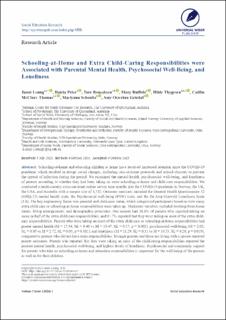| dc.description.abstract | Schooling-at-home and educating children at home have received increased attention since the COVID-19 pandemic which resulted in abrupt social changes, including stay-at-home protocols and school closures to prevent the spread of infection during the period. We examined the mental health, psychosocial well-being, and loneliness of parents according to whether they had been taking on extra schooling-at-home and child-care responsibilities. We conducted a multi-country cross-sectional online survey nine months into the COVID-19 pandemic in Norway, the UK, the USA, and Australia with a sample size of 1,722. Outcome measures included the General Health Questionnaire 12 (GHQ-12) mental health scale, the Psychosocial well-being (PSW) scale, and the De Jong Gierveld Loneliness Scale (LS). The key explanatory factor was parental and child-care status, which categorised participants based on how many extra child-care or schooling-at-home responsibilities were taken up. Moderator variables included working-from-home status, living arrangements, and demographic covariates. Our sample had 20.0% of parents who reported taking on some or half of the extra child-care responsibilities, and 11.7% reported that they were taking on most of the extra child-care responsibilities. Parents who were taking on most of the extra child-care or schooling-at-home responsibilities had poorer mental health (M = 17.34, SE = 0.40 vs M = 15.47, SE = 0.37, p = 0.002), psychosocial well-being (M = 2.92, SE = 0.05 vs M = 2.72, SE = 0.05, p = 0.011), and loneliness (M = 11.29, SE = 0.31 vs M = 10.33, SE = 0.28, p = 0.019), compared to parents who did not have extra responsibilities. Younger parents and those not living with a spouse reported poorer outcomes. Parents who reported that they were taking on most of the child-caring responsibilities reported the poorest mental health, psychosocial well-being, and highest levels of loneliness. Psychosocial and community support for parents who take on schooling-at-home and education responsibilities is important for the well-being of the parents as well as for their children. | en_US |

